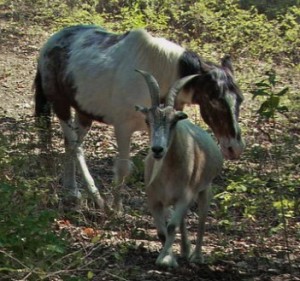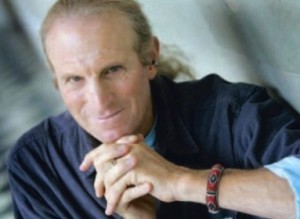By Maddy Butcher
Should we think of horses as animals with conscience and compassion?
Nature’s recent production of Animal Odd Couples offers some strong suggestions for how we may consider our fellow animals in general and horses specifically.
 Drs. Marc Bekoff and Temple Grandin are two of many scientists weighing in on whether animals can have friends and emotions in the hour-long documentary. To paraphrase:
Drs. Marc Bekoff and Temple Grandin are two of many scientists weighing in on whether animals can have friends and emotions in the hour-long documentary. To paraphrase:
Both say, “Of course.”
Both say humans and the rest of the animal kingdom are much more closely aligned behaviorally than we’d previously thought.
The remarkable hour-long documentary knits hard-core research together with more anecdotal footage. Watch it for free.
On the hard science end, Lauren Brent of Duke University has found that cortisol (stress hormone) levels go down in monkeys who have more friends. Oxytocin, a feel-good neurochemical, increases with mutual grooming.
Watch her TED talk here.
On the more informal, anecdotal end of the spectrum, Annette Tucker King discusses the 16-year relationship between Charlie, a blind horse, and Jack, his goat escort:
“We say that humans are the only animals with the capacity for compassion. I say that’s wrong. Some people are more compassionate than others. Some animals are more compassionate than other animals. But we’re all capable. We all have the same instinct to be compassionate,” said King, the founder and manager of Wild Heart Ranch, a federally licensed animal rescue center in Oklahoma.
 “Jack gets nothing out of this relationship. Charlie can neither protect nor provide for him. So what Jack is doing is protecting his friend. Period. End of story.”
“Jack gets nothing out of this relationship. Charlie can neither protect nor provide for him. So what Jack is doing is protecting his friend. Period. End of story.”
Dr. Bekoff, a former professor at University of Colorado, a Guggenheim fellow, and author of many books, has observed scores of similar scenarios. He likes to say:
“The plural of anecdote is data.”
It reminded me of a lecture by Dr. Noah Cohen, an epidemiologist who urged his fellow vets to collect data in their farm call travels. Good anecdotal evidence adds up within a veterinary practice. And when practices collaborate, that field evidence can be more powerful than results from the best research lab.
Or, as Cohen said at the 2011 AAEP convention, “a laboratory mouse is not equal to a horse.”
No one is dismissing lab research. But field observations, say these researchers, are just as valuable if collected well.
That’s also the premise of Evidence-Based Horsemanship, a book co-authored by Dr. Steve Peters, a scientist, and Martin Black, a horseman. Peters writes:
“Comparing research findings with someone possessing a wealth of empirical information is putting together pieces of the puzzle.”
So why are all these anecdotes of cross-species relationships relevant to scientists and to us, horse owners and junior scientists?
It’s because these cases don’t jibe with what we learned in school about predators behaving one way and prey animals behaving another way. Conventionally, we’ve been told individual species care only about their own survival. We’ve also been told we’re pretty much the only  species that cares about other animals. Other species’ altruistic acts have some underlying payback.
species that cares about other animals. Other species’ altruistic acts have some underlying payback.
Turns out the evolution of social behavior isn’t so simple, explained Bekoff (pictured at right) in a Forbes magazine interview:
“Rapidly accumulating data are showing that both nonhuman and human animals are by nature compassionate, kind, and empathic…
“Indeed, there are more and more scientists who now see how we’ve been misled…about the nature of animal minds and consciousness.”